No CrossRef data available.
Article contents
Recovering Rahner's Concept of Being in Spirit in the World
Published online by Cambridge University Press: 01 January 2024
Abstract

- Type
- Original Articles
- Information
- Copyright
- Copyright © The author 2009. Journal compilation © The Dominican Council.
References
1 Kilby, Karen, Karl Rahner: Theology and Philosophy (New York: Routledge, 2004), 1CrossRefGoogle Scholar.
2 Ibid., 2.
3 Ibid., 85.
4 Ibid., 127.
5 Thiel, John, Nonfoundationalism (Minneapolis: Fortress Press, 1994), 2Google Scholar.
6 Kilby, 6.
7 Henceforth, SW.
8 Henceforth, HoW.
9 Due to the spatial constraint, we will focus only on the first two arguments.
10 Ibid., 10.
11 Ibid., 10.
12 Ibid., 133.
13 Kilby, 11.
14 Ibid., 128.
15 Ibid., 75.
16 Ibid., 10.
17 Ibid., 75. “The semi-foundationalist, then, does not suppose Rahner to deduce or derive the whole of his theology from his philosophy: it is rather that at certain key points Rahner's theology requires the support of philosophically established claims.”
18 Ibid., 10.
19 Ibid., 17.
20 Kilby, 17.
21 Clarke, W. Norris SJ. Person and Being (Milwaukee: Marquette University Press, 2004), 3Google Scholar.
22 Rahner, Karl, Spirit in the World, trans. Dych, William S.J., (New York: Herder and Herder, 1966), 62Google Scholar.
23 Ibid., 57.
24 Ibid., 57.
25 Ibid., 57.
26 De Potentia q. 2, art. 1.
27 Spirit in the World, 59.
28 Ibid., 60.
29 Coreth, Emerich, Metaphysics trans. Donceel, Joseph (New York: Herder and Herder, 1968), 53Google Scholar.
30 Rahner, Spirit in the World, 61.
31 Ibid., 62.
32 For an intriguing treatment of “the world,” see Klein's, Terrance W. Wittgenstein and the Metaphysics of Grace (New York, Oxford, 2007)CrossRefGoogle Scholar.
33 Ibid., 62–63.
34 Klein, Terrance W., “Act and Potency In Wittgenstein?” Heythrop Journal XLVII (2006): 602.Google Scholar
35 Rahner, Spirit in the World, 68.
36 Ibid., 67.
37 Ibid., 68–9.
38 Ibid., 69.
39 Karl Rahner, Hearer of the Word, trans. Donceel, Joseph. (New York: Continuum, 1994), 30Google Scholar.
40 Rahner, Spirit, 71.
41 Ibid., 73.
42 Ibid., 75.
43 Rahner, Hearer., 36.
44 Rahner, Spirit, 81.
45 Burke, Patrick, Reinterpreting Rahner (New York: Fordham University Press, 2002), 44Google Scholar.
46 Ibid., 45.
47 Klein, Terrance, Wittgenstein and the Metaphysics of Grace (New York: Oxford, 2007), 110.CrossRefGoogle Scholar
48 Rahner, Spirit, 70.
49 Klein, Metaphysics of Grace, 107.
50 Rahner, Hearer, 38.
51 Here we see most clearly Rahner's Heideggarian patrimony. “Being-in-the-world, as concerned,” Heidegger writes, “is fascinated by the world with which it is concerned.” Heidegger, Martin, Being and Time trans. Macquarrie, John and Robinson, Edward (New York: HarperPerenial, 2008), 88Google Scholar. The world, for Heidegger, is not epiphenomenal. It is, rather, a fundamental existentiale or feature of Dasein's existence.
52 Clarke, Person and Being, 6.
53 Ibid., 6.
54 Ibid., 8.
55 Ibid., 9–10.
56 Ibid., 13.
57 Ibid., 14.
58 Ibid., 15.
59 Clarke, W. Norris, The One and the Many (Notre Dame: University of Notre Dame Press, 2001), 31Google Scholar.
60 Rahner, Spirit in the World, 95.
61 Rahner, Karl, Theological Investigations vol. 1, trans. Ernst, Cornelius OP (Baltimore: Halicon Press, 1969), 327Google Scholar.
62 Ibid., 13.
63 Ibid., 31.
64 Rahner, Spirit, 79.
65 Ibid., 79–80.
66 Ibid., 142.
67 Ibid., 142.
68 Ibid., 145.
69 Ibid., 162.
70 Ibid., 181.
71 Kilby, 29.
72 Kilby, 30.
73 Fiorenza, Francis Schüssler, “Method in Theology” in The Cambridge Companion to Karl Rahner, ed. Marmion, Declan and Hines, Mary (New York: Cambridge University Press, 2005), 77Google Scholar.
74 Rahner, Spirit, 178.
75 Wittgenstein, Ludwig, Tractatus Logico-Philosophicus, trans. Pears, D.F and McGuinness, B.F. (New York: Routledge, 2006), 5.Google Scholar


